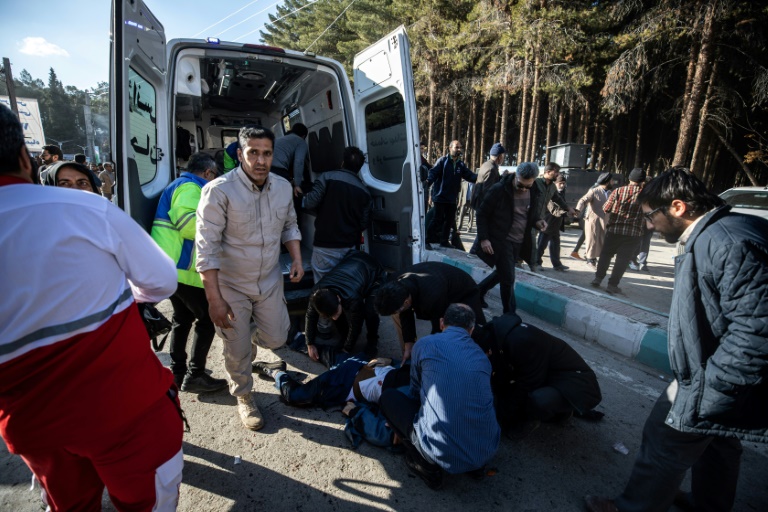What to know about Iran’s deadly twin blasts

No group has yet claimed responsibility for the double-tap bombing which killed 84 people at a memorial ceremony for storied Iranian general Qasem Soleimani, who was killed in a US drone strike in 2020
Tehran – Following the unclaimed twin bombings in Iran, speculation has swirled over who was behind them amid fears of widening conflict in the Middle East as war rages between Israel and Hamas.
Labelled a “terrorist attack” by Iranian authorities, the explosions on Wednesday killed at least 84 people and wounded nearly 300, making them the country’s deadliest in more than four decades.
No group has claimed responsibility for the attacks, which hit crowds commemorating Revolutionary Guards general Qasem Soleimani, four years after his death in a US drone strike.
Soleimani, who headed the Guards’ foreign operations arm the Quds Force, was also a staunch enemy of the Sunni extremist Islamic State group (IS) which has carried out attacks in majority-Shiite Iran.
Regional tensions have surged since Palestinian militant group Hamas launched deadly October 7 attacks on Israel, sparking the bloodiest ever Gaza war.
With investigations underway, here is a look at what we know:
– What happened? –
The blasts on Wednesday struck near the Martyrs Cemetery at the Saheb al-Zaman Mosque in Kerman, Soleimani’s southern hometown where he is buried.
The first explosion struck at around 2:45 pm (1115 GMT), around 700 metres (yards) from Soleimani’s grave. The explosives were placed inside a bag in a car, the official IRNA news agency said.
Around 15 minutes later, the second bomb went off in a rubbish bin, around one kilometre from the grave, IRNA said.
– Who’s to blame? –
Iranian authorities labelled the blasts a “terrorist attack”.
President Ebrahim Raisi’s deputy chief of staff for political affairs, Mohammad Jamshidi, charged that “the responsibility for this crime lies with the US and Zionist regimes (Israel) and terrorism is just a tool”.
Current Quds Force commander Esmail Qaani said the Kerman crowd was “attacked by bloodthirsty people supplied by the United States and the Zionist regime.”
Iran has long fought a shadow war of killings and sabotage with arch enemy Israel, and regularly accuses it, along with the United States, of inciting unrest in the country.
But for Ali Vaez, Iran project director at the International Crisis Group, Wednesday’s attack “doesn’t have the hallmarks of previous Israeli covert ops in Iran”, referring to killings of officials and nuclear scientists blamed on Israel.
Vaez noted on social media platform X that the attack was more in line with the methods of IS.
Washington on Wednesday rejected any suggestion that it or ally Israel was behind the deadly blasts, while Israel declined to comment.
“The United States was not involved in any way, and any suggestion to the contrary is ridiculous,” said State Department spokesman Matthew Miller.
If it were Israel, Vaez says, “it would be part of a campaign of maximum provocation”, especially following a recent Beirut strike on Hamas deputy leader Saleh al-Aruri, and the killing near Damascus of senior Guards commander Razi Moussavi in December.
– What’s next? –
Iranian security analyst Heshmatollah Falahatpisheh believes the attacks may have involved Sunni extremist groups but “were not possible without” US and Israeli intelligence services.
He believes they could be “a sign sent to force Iran to negotiate and ask it to cooperate in the management of regional tensions”.
The United States has accused Iran of “actively facilitating” attacks on US forces in the Middle East. It also said Tehran was “deeply involved” in attacks by Yemen’s Huthi rebels on merchant vessels in the Red Sea.
President Ebrahim Raisi has said Iran sees it as “its duty to support the resistance groups” but insisted that they “are independent in their opinion, decision and action”.
Falahatpisheh said Wednesday’s blasts in Iran could involve operatives from the Islamic State and Jaish al-Adl, a Sunni extremist group formed in 2012.
Iran has been actively battling jihadist and extremist groups that have claimed multiple attacks in the country over the years.
“The next question is how is Iran going to respond,” said Vaez.
“If it blames Israel, it is likely to try to respond in kind — targeting high value or soft targets somewhere.”
“If it blames ISIS or separatist groups, expect arrests/executions and even missiles fired into their bases in the region.”
